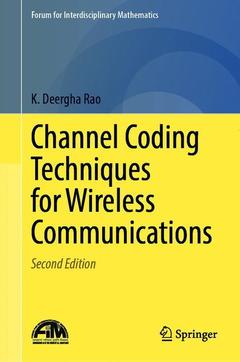Description
Channel Coding Techniques for Wireless Communications (2nd Ed., 2nd ed. 2019)
Forum for Interdisciplinary Mathematics Series
Author: Rao K. Deergha
Language: English
Subjects for Channel Coding Techniques for Wireless Communications:
Publication date: 12-2019
Support: Print on demand
Publication date: 12-2020
476 p. · 15.5x23.5 cm · Paperback
Description
/li>Contents
/li>Biography
/li>Comment
/li>
K. Deergha Rao is Professor at the Department of Electronics and Communication Engineering, Vasavi College of Engineering, Osmania University, Hyderabad, India. He is former Director and Professor of Research and Training Unit for Navigational Electronics (NERTU), Osmania University. He was a postdoctoral fellow and part-time professor for four years at the Department of Electronics and Communication Engineering, Concordia University, Montreal, Canada. His teaching areas are signals and systems, digital signal processing, channel coding techniques, and MIMO communication systems. Professor Rao has executed research projects for premium Indian organizations such as DRDO, HAL, and BEL and is interested in research areas of wireless channel coding, MIMO-OFDM communications, image processing, cryptosystems, and VLSI signal processing. He has also served as the founder chairman of the joint chapter between IEEE Communications Society and IEEE Signal Processing Society in Hyderabad from 2010–2012 and communications track chair for IEEE INDICON 2011 held in Hyderabad. Five students have been so far awarded Ph.D. degrees under Professor Rao, while three are currently working towards their Ph.D.
An awardee of the IETE K. S. Krishnan Memorial Award for the best system oriented paper in 2013, Prof. Rao has presented papers at IEEE International conferences several times in the USA, Switzerland, Russia, and Thailand. He has more than 100 publications to his credit including more than 60 publications in the IEEE journals and conference proceedings. Professor Rao is the author of two books—Channel Coding Techniques for Wireless Communications (Springer, 2015) and Signals and Systems (Springer, 2018)—and has co-authored Digital Signal Processing (Jaico Publishing House, 2012) and Digital Signal Processing: Theory and Practice (Springer, 2018). He is an editorial board member for the International Journal of
Presents a clear and comprehensive overview of all aspects of coding theory for wireless channels
Allows readers to gain an understanding of the fundamentals, design, implementation, and applications of coding for wireless channels
Includes examples of turbo codes, LDPC codes, LT codes, Raptor codes, and space–time coding, and presents coding and decoding processes as well as the traditional block codes and convolutional codes
Includes an in-depth study of multiple-input, multiple-output (MIMO) wireless channel in which multiple antennas are used in both the transmitter and the receiver
Illustrates coding techniques and concepts with several fully worked numerical examples
Covers freely downloadable MATLAB-based programs to enhance readers’ understanding of the underlying theories




